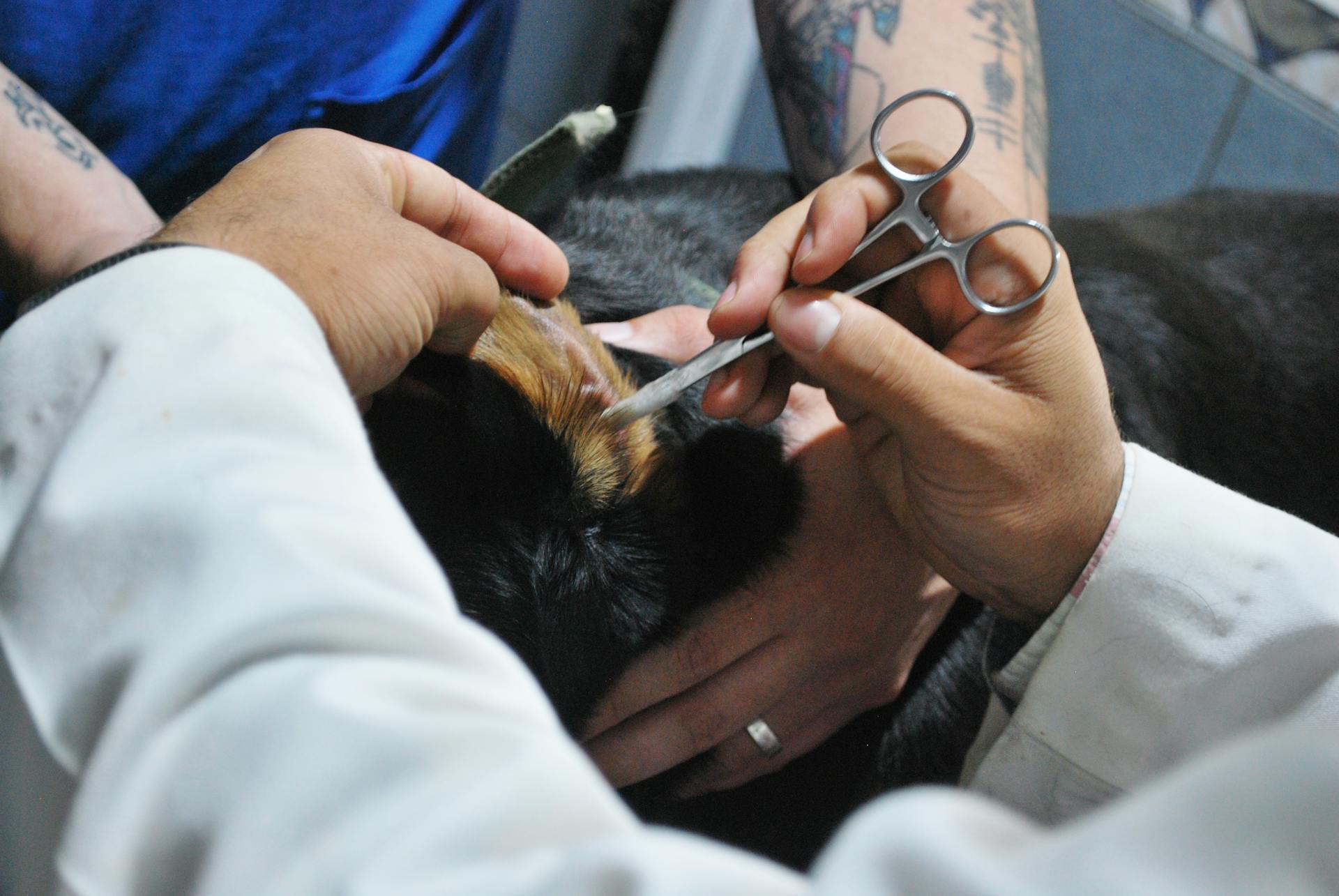
Dog ear odor can be a real nuisance, but the good news is that there are effective homemade solutions to tackle the problem.
Apple cider vinegar is a natural antibacterial agent that can help eliminate ear odor.
One of the simplest homemade remedies involves mixing equal parts apple cider vinegar and water and gently pouring it into the ear canal.
This solution can help restore the natural pH balance of the ear and reduce bacterial growth.
Regular cleaning of the ears with a cotton ball or soft cloth can also help prevent the buildup of wax and debris that can contribute to ear odor.
You might like: Apple Cider Vinegar in Dogs Water Benefits
Causes and Symptoms
Ear infections are a common issue in dogs, and understanding their causes and symptoms is essential for effective treatment. Ear infections can cause significant discomfort and lead to more serious health issues if left untreated.
The canine ear canal is more prone to ear infections due to its unique shape, which holds in fluid and creates a prime growing environment for bacteria and yeast. Moisture, allergies, and endocrine disorders are some of the factors that may predispose your dog to ear infections.
Some common symptoms of ear infections in dogs include frequent head shaking, scratching or pawing at ears, redness and swelling, odor, discharge, pain and sensitivity, and balance issues. Ear infections are painful for pups, and you'll likely see your dog scratching at his ears or shaking his head.
Here are some common causes of ear infections in dogs:
- Moisture, which can create a prime growing environment for bacteria and yeast
- Allergies, which lead to ear disease in about 50 percent of dogs with allergic skin disease and 80 percent of dogs with food sensitivities
- Endocrine disorders, such as thyroid disease
- Autoimmune disorders
- Wax buildup
- Foreign bodies
- Injury to the ear canal
- Excessive cleaning
What Causes?
Ear infections in dogs are caused by a combination of factors, including bacteria, yeast, and ear mites in puppies. The unique shape of a dog's ear canal, which forms an L-shape, can trap moisture and create an ideal environment for these germs to grow.
Moisture is a significant contributor to ear infections, making it essential to keep your dog's ears dry, especially after swimming or bathing. Allergies are another common cause, affecting around 50% of dogs with allergic skin disease and 80% of dogs with food sensitivities.
Ear infections can also be triggered by endocrine disorders, such as thyroid disease, and autoimmune disorders. Wax buildup and foreign bodies can also cause infections, especially if they're not removed promptly. In some cases, injury to the ear canal can lead to infection.

Here are some common factors that predispose dogs to ear infections:
- Moisture
- Allergies
- Endocrine disorders
- Autoimmune disorders
- Wax buildup
- Foreign bodies
- Injury to the ear canal
It's worth noting that excessive cleaning can also cause irritation and potentially lead to infection. By understanding the root cause of ear infections, you can take steps to prevent or treat the underlying issue and keep your dog's ears healthy.
Symptoms
Dogs with ear infections often show signs of discomfort, and it's essential to identify these symptoms early on. Head shaking is a common indicator, as dogs try to relieve the pain and itchiness.
Scratching at the affected ear is another telltale sign, and you may notice dark discharge or a strong odor coming from the ear canal. Redness and swelling of the ear canal can also be a sign of an ear infection.
In some cases, dogs may exhibit pain or itchiness, leading them to scratch or paw at their ears excessively. Crusting or scabs in the ears can also be a sign of an ear infection.
Here are some common symptoms of ear infections in dogs:
- Frequent Head Shaking
- Scratching or Pawing at Ears
- Redness and Swelling
- Odor
- Discharge
- Pain and Sensitivity
- Balance Issues
If left untreated, ear infections can lead to more serious health issues, so it's crucial to seek veterinary care if you notice any of these symptoms.
Prevention and Treatment
Prevention is key when it comes to dog ear odor. Dry your dog's ears thoroughly after bathing or swimming to prevent moisture from lingering and causing an infection.
To keep your dog's ears healthy, clean out any foreign objects you see in the outer ear. Remove any debris that may be stuck in their ears, as it can cause infection.
Using harsh cleansers on your dog can dry out their ears and make them prone to infection. Opt for a mild shampoo that won't strip their skin of its natural oils.
Providing supplements like Omega-3 fatty acids can help enhance your dog's immune system and keep their skin healthy. These acids are found in foods like hemp seed, salmon, and flaxseed oil.
Here's a quick rundown of how to clean your dog's ears:
- Fill the canal with a dog ear cleaning solution and massage the vertical ear canal from the outside.
- Wipe out the canal with absorbent gauze.
- Don't use paper towels or cotton, as they can leave fibers behind and cause irritation.
Remember to always consult with your veterinarian for advice on preventing and treating dog ear infections.
Home Remedies
Cleaning your dog's ears regularly is key to preventing infections and reducing ear odor. You can purchase a dog earwash from your veterinarian or a pet store, or mix half water and half white vinegar to make your own cleaning solution at home.
It's essential to keep your dog's ears clean and dry to prevent ear infections. Pashaian-Grant recommends cleaning your dog's ears at least once a month. You can use a soaked cotton ball or gauze to wipe out the ear, but avoid pouring liquid directly into the ear canal if you suspect your dog has an infection.
Treating the underlying cause of ear infections is crucial to preventing them from recurring. This is often due to allergies to food proteins, dust mites, or seasonal allergens. By addressing the root cause, you can provide a long-term solution for your dog's ear health.
Here are some natural ear infection remedies you can try:
- Mullein drops
- Green tea
- Apple cider vinegar
- Calendula
Remember to always check with your veterinarian before trying any new remedies, especially if your dog has a severe ear infection or is prone to ear problems.
Types and Conditions
There are three main types of ear infections that can cause dog ear odor: yeast infections, bacterial infections, and mite infestations. These conditions can be caused by an overgrowth of yeast, bacteria, or a parasitic mite.
Yeast infections are the most prevalent type of ear infection in dogs, caused by an overgrowth of yeast in the ear. This can lead to inflammation and unpleasantness for your dog.
Bacterial infections can be caused by germs like Staphylococcus, Escherichia coli, and Klebsiella spp, and pseudomonas that overtake the ear and cause an infection. These bacteria love dark, moist places.
Mite infestations occur when Otodectes cynotis, a parasitic mite, sets up shop in your dog's ears. These mites feed on the wax and oil in the ear, causing extreme itchiness and discomfort for your dog.
Here are the three main types of ear infections that can cause dog ear odor:
- Yeast infections
- Bacterial infections
- Mite infestations
What Is an Infection?
An infection occurs when bacteria, yeast, or another irritant runs amok in your dog's delicate ears.
These infections cause inflammation in the outer, middle, or inner ear.
Some common symptoms of an ear infection in dogs include discharge and an unusual odor.
Your dog will be uncomfortable and may exhibit behaviors like scratching, head shaking, and whining to indicate their discomfort.
Dogs with certain breeds, such as Basset Hounds and Cocker Spaniels, are more prone to ear infections due to their ear structures.
For your interest: Dog Ear Infection after Grooming
Types of Mites
There are several types of mites that can infest your dog's ears. Otodectes cynotis, a parasitic mite, is a common culprit. These pesky creatures feed on the wax and oil in the ear, causing extreme itchiness.
Ear mites are microscopic bugs that can infest your dog's ears. They spread from animal to animal, or your pup can pick them up by simply lying down outdoors. They don't bite, but their presence irritates the skin in your dog's ears and makes them itch a lot.
Some common signs of a mite infestation include excessive scratching, shaking of the head, and a strong, unpleasant odor. If you suspect your dog has ear mites, it's essential to take action quickly to prevent further irritation and potential ear infections.
Here are some common types of mites that can affect your dog's ears:
- Otodectes cynotis: This parasitic mite is a common cause of ear mite infestations in dogs.
It's worth noting that ear mites can lead to ear infections if left untreated. Regular ear cleaning and veterinary check-ups can help prevent this from happening.
Yeast Overgrowth

Yeast overgrowth is a common issue in dogs, and it's characterized by a yeasty smell and dark brown discharge in the ears.
This type of infection is often accompanied by itching, but it's usually not painful.
If your dog's ears are affected, you might notice a yeasty smell and dark brown discharge, which are both signs of yeast overgrowth.
It's essential to note that yeast exists naturally in healthy ears, but an imbalance can cause problems.
Yeast overgrowth can be treated, and you can find more information on how to manage dog ear yeast infections in a separate section.
Suggestion: Dog Smell
Moisture and Hygiene
Dogs with floppy ears, like hounds and spaniels, are more prone to ear infections because bacteria and yeast thrive in moist, dark areas.
Floppy ears trap moisture, making it easy for germs to overgrow, whereas upright ears allow air to circulate and keep them dry.
Puppies in a litter can also spread ear infections by licking and pulling on each other's ears.
Regular cleaning and drying of your dog's ears can help prevent infections and reduce the risk of ear odor.
Sources
- https://www.akc.org/expert-advice/health/dog-ear-infections/
- https://www.dailypaws.com/dogs-puppies/health-care/dog-conditions/dog-ear-infection
- https://www.holistapet.com/blogs/home-remedies-for-dogs/ear-infection
- https://www.whole-dog-journal.com/care/homemade-ear-cleaner-for-dogs/
- https://www.dogsnaturallymagazine.com/5-home-remedies-for-dog-ear-infections/
Featured Images: pexels.com


